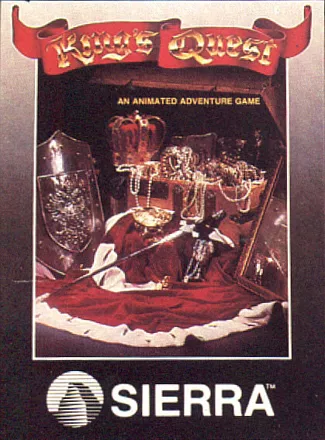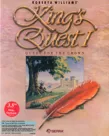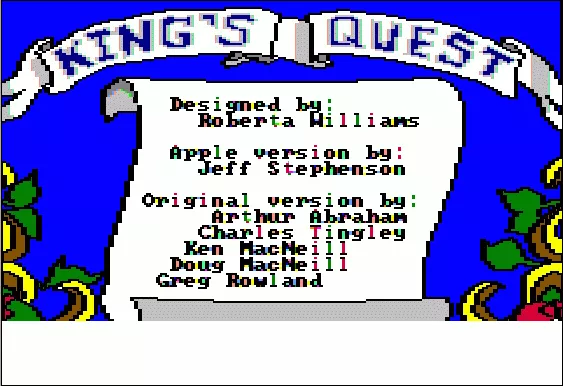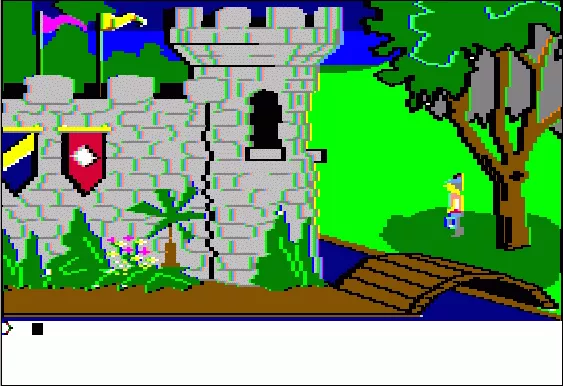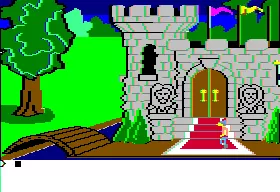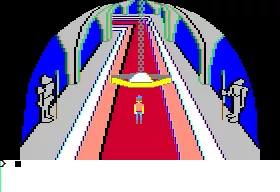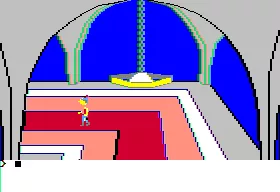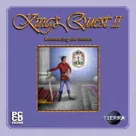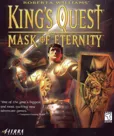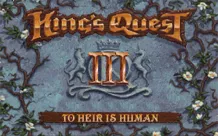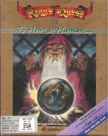King's Quest
Description official descriptions
Sir Graham is a brave knight who is sent on a quest to retrieve three treasures that were stolen by deception and stealth: a shield that protects its bearer from invaders, a mirror that foretells the future, and a treasure chest that is forever filled with gold. If Graham takes these treasures back to the royal castle, then the ailing King Edward the Benevolent of Daventry will hand over the crown. During his travels, Graham will meet characters that will either help or hinder him.
King's Quest is commonly considered the progenitor of third-person-perspective adventure games. As opposed to earlier graphic adventures, the player is able to navigate the protagonist on screen in eight directions, creating an effect of three-dimensional exploration. The player character can also be obscured from view when hiding behind an object, is subjected to gravity, and has different animations for actions such as picking up an item, falling, swimming, etc. Graham can be moved around with arrow keys and perform various actions when the player types commands, normally consisting of noun and verb combinations (e.g. "Take flower", "Talk man", etc.).
The game world consists of a cyclic outdoor area with places of interest (houses, characters, etc.) that must be found through exploration. Much of the kingdom is accessible to Graham from the beginning, and there are only a few restrictions imposed on traveling. In order to complete the game, the player has to procure certain items and use them in correct situations or with specific characters. Some of the puzzles rely on fairy tales, and a good knowledge of those makes them easier to solve.
The game awards the player points for most of the actions he makes Graham perform. Since some of those are not crucial to completion, it is quite possible to finish the game without having attained the full score. Some of the tasks in the game have multiple solutions, though the game may grant the player less points if he chooses the simpler one. Many hazards await Graham on his journey, and death is frequent if the player is not careful. The game can also be rendered unwinnable by failing to collect a specific item or wasting it.
Groups +
Screenshots
Credits (PC Booter version)
11 People (8 developers, 3 thanks)
| Design | |
| Programming | |
| Graphics / Artwork | |
| Writing / Dialogue / Story | |
| Special Thanks To |
Reviews
Critics
Average score: 68% (based on 19 ratings)
Players
Average score: 3.5 out of 5 (based on 187 ratings with 12 reviews)
The original King of Computer Games.
The Good
When I read reviews that give King's Quest a bad impression, it makes me as a grown man want to cry like a little girl with a skinned knee. It also makes me mutter things like "Kids these days wouldn't know a good game if it jumped up and hit them in the face!", even though I'm not yet 30 myself.
I can only assume, for own peace of mind and faith in the human race, that anybody slamming King's Quest is doing so by today's gaming standards, and not the gaming standards of its time. Because in 1984, when Sierra first revolutionized the computer world by releasing this game, King's Quest was the crowned King of Computer Games, and remained so for many years.
From a technical perspective, Ken and Roberta Williams and the Sierra team broke so many new levels with this game, and then again with its next few sequels over the next decade, that it seemed to me as a kid that Sierra would rule the gaming world forever. In a time of text adventures and blocky monochrome arcades, they released a full color multi-dimensional game where you could actually physically MOVE the hero around a detailed fantasy world, in front of, behind, and around objects, and interface with items, terrain, and other characters in an involving storyline and several challenging quests.
Later, when other game companies picked up on the technology, Sierra released sequels that were not only more and more playable, detailed, story-rich and entertaining with each game, but made new technology headlines every time. As KQ1 was the first game to ever make use of a CGA color, PC speaker musical sound and comprehensive text parser interface, KQ4 was the first game to use detailed EGA graphics and support for the new (back then) Adlib/Soundblaster rich audio and music. And when that very quickly became commonplace, KQ5 was released with vivid 256 color VGA graphics and a previously unheard of point-and-click mouse interface instead of the old text parser.
But back to the original. A few of the MobyGames reviews for King's Quest 1 say that the game is noteworthy only for these technology breakthroughs and its historic significance in the gaming industry, but as a game in and of itself, it has almost no merit. This could not be further from the truth.
While the storyline, gameplay and quests of KQ1 may seem pale and pointless by today's standards, imagine yourself as a child in 1984. This game wasn't made for hardcore teen/adult gamers in the 21st century, it was made for kids in the early 80's. And in that light, it was magical. With dragons to slay, magical artifacts to collect, and all manner of mystical creatures from fairies to trolls to leprechauns and everything in between, King's Quest was like an interactive movie or book where YOU get to be the hero. As a kid in 1984, who grew up on films like NeverEnding Story, Legend, and The Dark Crystal, bringing the fantasy world of wizards and warriors, dragons and princesses, magic and intrigue, to the interactive medium of computer gaming - that in itself was more remarkable than the actual technological breakthroughs Sierra made with this game.
The Bad
As several other reviewers have noted, there are aspect of the game that can seem bland and frustrating, not just by today's standards but even back in 1984. I feel it's important to note though, that these for the most part were simply the effects of technological barriers that even Sierra couldn't break through at the time, not design flaws in themselves. The text parser, for example, is frustratingly limited. Things need to be worded a certain way. You might see a brown CGA lump on the ground and want it, but typing "PICK UP ROCK" could very well yield you a "You can't do that - at least not now." error (prevalent throughout the first three KQ games!). But a little patience and a logical mind can always overcome this limitation. "LOOK AT THE GROUND". You'll see it's not a rock after all, it's actually a walnut. Don't try and be verbose - the parser isn't as intelligent as today's gaming AI technology. You can't tell the game "Offer to help the woodcutter with his poverty issues" without getting a "I don't understand 'offer'." error, but "HELP MAN" does the trick.
Also, one or two of the puzzles were a little too complex with too few clues for a child's mind. The only clue, for example, to the gnome's name, is a completely unrelated note found in the witch's house that says "Sometimes it is wise to think backwards". However, simply writing the most likely name for a straw-to-gold spinning gnome back to front is not the answer - at least not until the EGA remake of the game was released.
Overall though, these are tiny flaws in what was and remains to be one of the greatest computer games of our time. Even today, two decades after its original release, I once in a while dust it off and play it again - even though I know the game by heart better than I know my own mother's birthday!
The Bottom Line
"Kids these days" {evilgrin} think they're "old school" if they remember finishing Doom or the original Wolfenstein. In my personal opinion, you're not even a gamer unless you've played King's Quest. In a world where most of today's games involve fragging the crap out of your friends with a multitude of high-tech weapons over a LAN or the internet and watching the blood and brain fragments fly, I'd like to think there are others like me out there who remember when good gaming involved using your mind, not your minigun, and a good game was good because of the storyline and gameplay itself, not just because it uses the latest ultra-fast 3D graphics technology, has heaps of powerful weapons and needs 2Gb of RAM and a $700 video card to play. As much as I hate to say it, but "those were the days"! =)
DOS · by Vaelor (400) · 2004
How a fairy tale expert can become alligator food
The Good
The first thing we need to understand when attempting to analyze King's Quest is its historical significance. It was more than just the first installment of a long and successful series; more even than a template its creators have been building upon ever since. It was, in fact, the first real adventure game where you navigated an on-screen character through the only kind of world that this perspective allowed to be called "three-dimensional" that time.
Before this game, all we could do in adventures was, at best, view still screens with text and some graphics representing locations. Only action games allowed us to move around a little digital incarnation of ourselves. The great achievement of King's Quest was transferring common mechanics of adventure genres into a world ripe with hazards that suddenly became so much more real because they actually physically happened to our avatar. It's one thing to type "N" or "W" and another to quickly run away from a maniacal ogre as he begins chasing you. It might be fulfilling to type "go upstairs", but certainly less so than actually doing it and trying not to fall down. When you pick up an item, you can see exactly how it is done. When you swim underwater, you stay with your character instead of letting the game do it for you.
It is customary to mock Sierra for inserting too many death scenes in their games. In some games they really overdid this mechanic, and it started to feel cheap as adventure game development was advancing and designers found better means to convey danger and make their worlds more absorbing. But this hardly applies to the first King's Quest, where this design philosophy was undeniably intentional and where constant danger added so much suspense to what was essentially a stroll through fairly repetitive outdoor areas.
King's Quest remains one of the surprisingly few examples of a truly non-linear adventure game. Even its own sequel, released shortly afterwards, forced you to complete its three "door-opening" quests in a specific order. Here, you can work on finding the three needed objects simultaneously, with nothing to restrain you. You can walk around as much as you want, provided you are careful enough, studying local geography and fauna, and gradually getting acquainted with the land. The freedom of choice gives the game a wonderful feeling of breadth and true adventuring spirit, surpassing in that sense the strangulating linearity of many later games.
The game awards you points for most of the actions you perform. That was one of Sierra's best inventions, again taking something from arcade games and applying it to a completely different genre. This simple feature gave adventures something other companies generally paid less attention to: replay value. You can complete King's Quest without having scored full points. You can, in fact, bypass some of the most confusing puzzles entirely and still finish the game. But then you'll want to play it again and find out what you might have missed. King's Quest also does what many later games stopped doing: offer multiple solutions to puzzles. You can, for example, slay the dragon in the game if you manage to find a rather well-hidden weapon. But a more interesting, non-violent way will yield more points as well.
King's Quest has fantastic graphics. We are talking about the year 1984, and I don't think there was much on the market that looked better than this. Already the very first screen of the game renders us speechless, displaying a colorful castle adorned with banners waving in the wind, fully animated alligators swimming around in the moat, and our fashionable hero proudly strolling with his feathered hat. Most people today are only familiar with the updated EGA version that came out three years later; but the original release looked stunning with its CGA composite mode.
The Bad
The flaws of King's Quest are all too obvious if we compare it to the generally more fondly remembered comedy games Sierra started doing later. Roberta Williams was probably thinking of children when she created the setting for the game, populating its world with harmless characters cut out of various fairy tales that didn't mesh with each other particularly well. A bad witch, a bad troll, a goat who likes carrots, a sleeping giant, a poor woodcutter and a few others are a far cry from some of the creatures you would encounter in earlier Infocom titles. The problem is that the game turned out to be too hard and punishing for children, ending up entertaining adults with magic beanstalk and a gnome whose name couldn't be guessed by rocket scientists.
As a result, the main problem of King's Quest becomes its lack of personality. There is really nothing distinguishing about anything you see or read in the game. The text is clearly written and at times attractive with its underlying energy, but ultimately rather plain and lacking wit and imagination. There is also not much of it, and though it is charming that sometimes you can receive feedback for actions that have nothing to do with advancing the plot, on many other occasions the game stubbornly refuses to cooperate, spouting out saddening strings of "You can't do that - at least not now" and "I don't understand ___".
In the realm of gameplay, this is manifested in the absence of a general "Look" command, which I really missed here. You can get fairly good descriptions for rooms, but as you explore lovely meadows and swim through serene lakes you won't be able to read anything like "Gleaming rays of Helios are surrealistically reflected in the depths of the hydrogen-filled basin, just as your own soul seeks astral redemption for your past karmic misdemeanors" or whatever.
The puzzles rely too much on the player's knowledge of fairy tales. I grew up outside of the Anglophone community that seems to be very fond of that particular genre, and therefore some of the solutions made very little sense to me. It was also confusing to reach dead ends more often than I wanted to, but after a while they sort of grew on me. Seriously, what is it about the modern obsession with absolute security in games? It's okay when games try to trick you, and it's rewarding when you figure out its tricks and avoid its traps.
The Bottom Line
King's Quest is a great technological achievement we should thank for opening the doors to a wonderful genre, but it's also more than that. It's easy to ridicule its shortcomings nowadays, but if you mentally teleport to its time you'll discover a surprisingly involving open-ended adventure with its own peculiar charm.
DOS · by Unicorn Lynx (181780) · 2017
The one that started it all...
The Good
This was my first "real game" - finally something that didn't involve shooting or similar arcade-like games. King's Quest was the stepping stone to what adventure games evolved today.
Boy was this game awesome back then! Interactive fiction with graphics was one thing, but having real graphics and manipulating with them was another...and so much color too! It's funny how great the graphics were back then, but looking back, boy do they look crappy...I wonder what graphics will look like in the future...hmmm.
Anyway, this game was THE adventure game. Walk anywhere, do anything, well type anything would be more exact... The educational value of games like this is that if forces you "To Type" and it forces you "To Spell". Sure, using the mouse is easy and faster, but can you type a whole page without looking at the keyboard or the monitor? This game helped me a lot in my learning the English vocabulary...King's Quest and Sesame Street would be my greatest influence...hehe
I also appear to be the only one who actually enjoys those beeping sounds as a poor excuse for music. Yes, honestly it was crappy...but it sure did have a nice tune to it...
The Bad
Hey, it would be nice not to save my game every couple of minutes for the fear of dying...it was fun the few couple of times, but those crocodiles do get irritating when you forget to where your walking to. Sierra has never got over the fact that focusing on game play is a little more important than finding 1001 ways to die.
Were puzzles too hard? Depends, when you were my age...somewhere between 8-10 some puzzles do get a little to hard to understand. I never could figure out what that stupid dwarf's name was, and I find it even more stupid to enter a name longer than the freakin` alphabet.
Well at least I had fun watching that goat wank the troll bridge...
The Bottom Line
Way up there in the Valhalla of legendary classics. If you've never played KQ I before...playing the original may be not quite as exciting. You could play the freeware fan-made VGA version of King's Quest I by Tierra Entertainment. I do believe you can download the game from their website. It's a big download, but it may very well be worth it for nostalgia's sake.
DOS · by Indra was here (20756) · 2003
Discussion
| Subject | By | Date |
|---|---|---|
| Year PCjr? | Edwin Drost (9385) | Mar 21, 2017 |
| Any other adventure games like KQ1&3? | Lain Crowley (6629) | Mar 30, 2012 |
Trivia
Code Decryption
The developers used encryption to hide code from prying eyes. The encryption key was Avis Durgan. However, according to PC Gamer (July 2000), nobody can remember why this key was chosen or who Avis Durgen is -- not even Ken Williams!
.. but Al Lowe does remember:
Avis was Jeff Stephenson's wife's maiden name. I guess he was in love!
Development
Originally developed by Sierra On Line and produced by IBM as a show piece for the IBM PCjr. The game was later produced by Sierra and was the foundation of the best-selling King's Quest series.
Graham
Sir Graham was so named because of designer Roberta Williams' fondness for graham crackers.
IBM Front Cover
Check out the IBM box's front cover--it has a completely wrong description and picture of King's Quest; this is because the box ad copy was written before the game was completed.
Novels
From 1995 through 1996 Boulevard Books published a trilogy of novels inspired by the King's Quest game setting of Daventry and featuring members of its royal family as the main protagonists:
- The Floating Castle (1995), by
Craig Mills , dealing with adventures Prince Alexander experiences between the events ofKing's Quests V andVI ; - The Kingdom of Sorrow (1996), by
Kenyon Morr , filling in some blanks regarding King Graham's activities betweenKing's Quests II andIII ; and - See No Weevil (1996), also by Kenyon Morr, taking place seven years after the Kingdom of Sorrow and giving Graham's daughter, Princess Rosella, a chance to rule as regent during a crisis.
References
The flag of Daventry, as seen in the throne room, is in fact the flag of Sierra Leone. This is actually a pun referring to the development company, Sierra On-Line.
References to the Game
The website Homestarrunner.com created a game named Peasent's Quest quite similar to King's Quest. It has EGA graphics, text based typing, and the main character Rather Dashing is designed a little like Sir Graham.
Re-release
A complete version of King's Quest is available on Classic Games Collection CD featured with the July 2000 issue of PC Gamer Magazine.
Rumpelstilskin Puzzle
One puzzle, naming the gnome's real name must have been deemed too hard (or obscure) in the original version of King's Quest. I believe the clue was "Think back-wards" or something along those lines. The answer? The player had to write out the alphabet as follows:
ABCDEFGHIJKLMNOPQRSTUVWXYZ ZYXWVUTSRQPONMLKJIHGFEDCBASubstitute the letters from Rumplestiltskin with the letter below on the line. Of course most people entered Rumplestiltskin spelled backwards (logical) and this didn't work. In the SCI (1987) re-release of the game, the puzzle was made simpler with Rumplestiltskin backwards being the correct answer.
Technology
King's Quest was the first Sierra game to use the AGI game engine, which was used in Sierra's later games throughout the '80's. The way the engine was setup made it easy to port a game written with AGI to other computer platforms.
Awards
- GameStar (Germany)
- Issue 01/2007 - One of the "Ten Most Influential PC-Games". It managed to link texts and graphics and caused the rise of Graphic Adventures.
- The Strong National Museum of Play
- 2020 – Introduced into the World Video Game Hall of Fame
Information also contributed by Andrew Shepard; Indra, Joakim Möller, Pseudo_Intellectual, Ricky Derocher, rstevenson, Shai Greenberg, Tibes80, and Ye Olde Infocomme Shoppe.
Analytics
Upgrade to MobyPro to view research rankings!
Related Sites +
-
AGD Interactive
Download King's Quest 1 remake for free -
Game Map (Sega Master System)
Images with maps of all locations and their position to each other. -
King's Quest Realm
An interesting sight devoted to the entire King's Quest series. It offers hints, a message board and a superb section devoted to the history of these popular games. -
King's Quest at Wikipedia
Includes an entire history and list of creatures, games in the series and more. -
ScummVM
supports the DOS, Macintosh, Amiga, Atari ST, Apple IIgs versions of King's Quest under Windows, Linux, Macintosh and other platforms. -
Sierra Gamers
The Official Website of Ken Williams and King's Quest creator, Roberta Williams. -
The King's Quest series at Game Nostalgia
An illustrated overview of King’s Quest 1984 up to King's Quest: Mask of Eternity (including various fan games).
Identifiers +
Contribute
Are you familiar with this game? Help document and preserve this entry in video game history! If your contribution is approved, you will earn points and be credited as a contributor.
Contributors to this Entry
Game added by Andy Roark.
Amiga added by POMAH. Apple II added by KnockStump. Macintosh added by Martin Smith. SEGA Master System added by Katakis | カタキス. Apple IIgs added by Garcia. Atari ST added by Belboz.
Additional contributors: Trixter, Paul Budd, Indra was here, Katakis | カタキス, Jeanne, Guy Chapman, Andrew Shepard, game nostalgia, Macs Black, Picard, Patrick Bregger, Jo ST, SoMuchChaotix.
Game added May 18, 1999. Last modified February 13, 2024.
